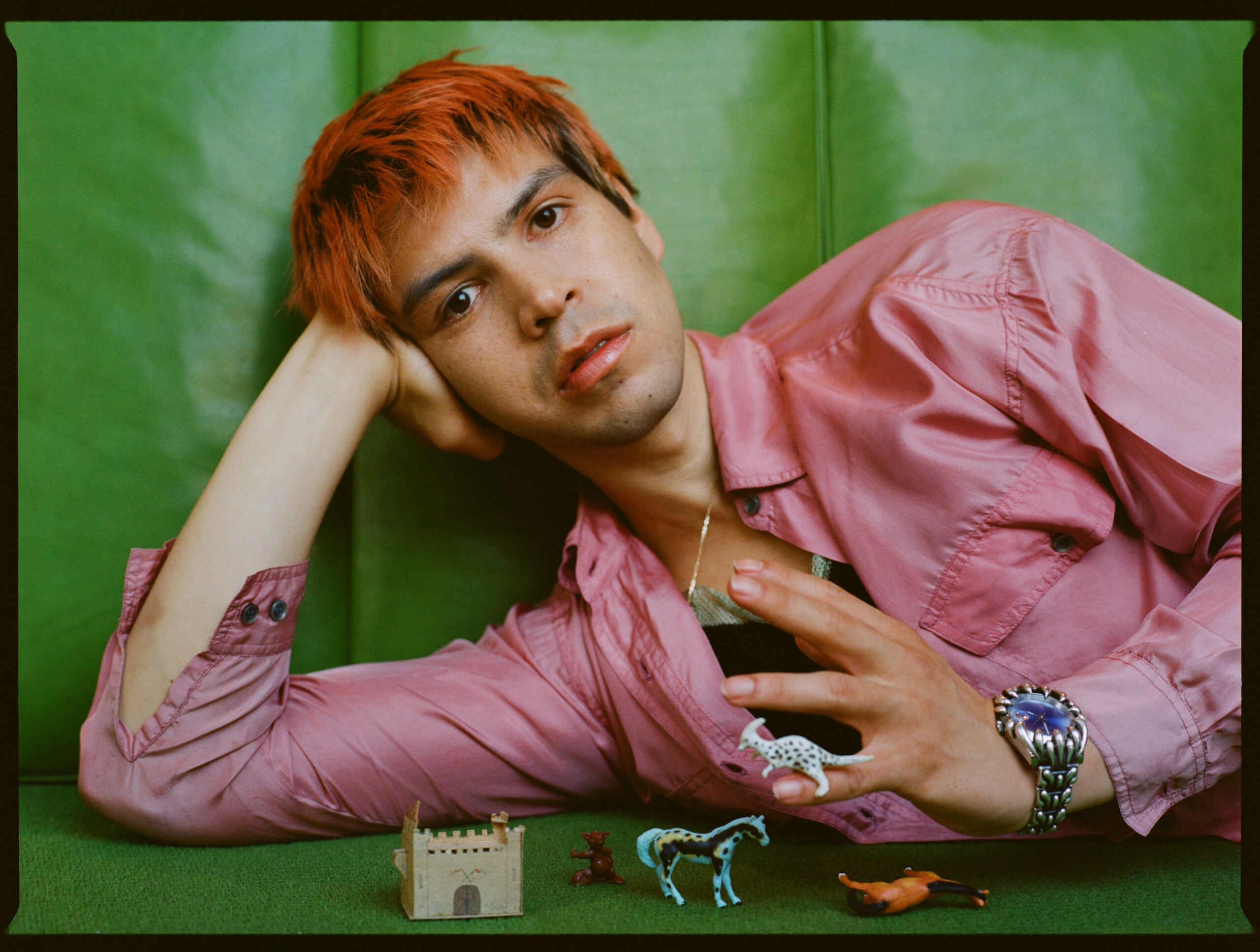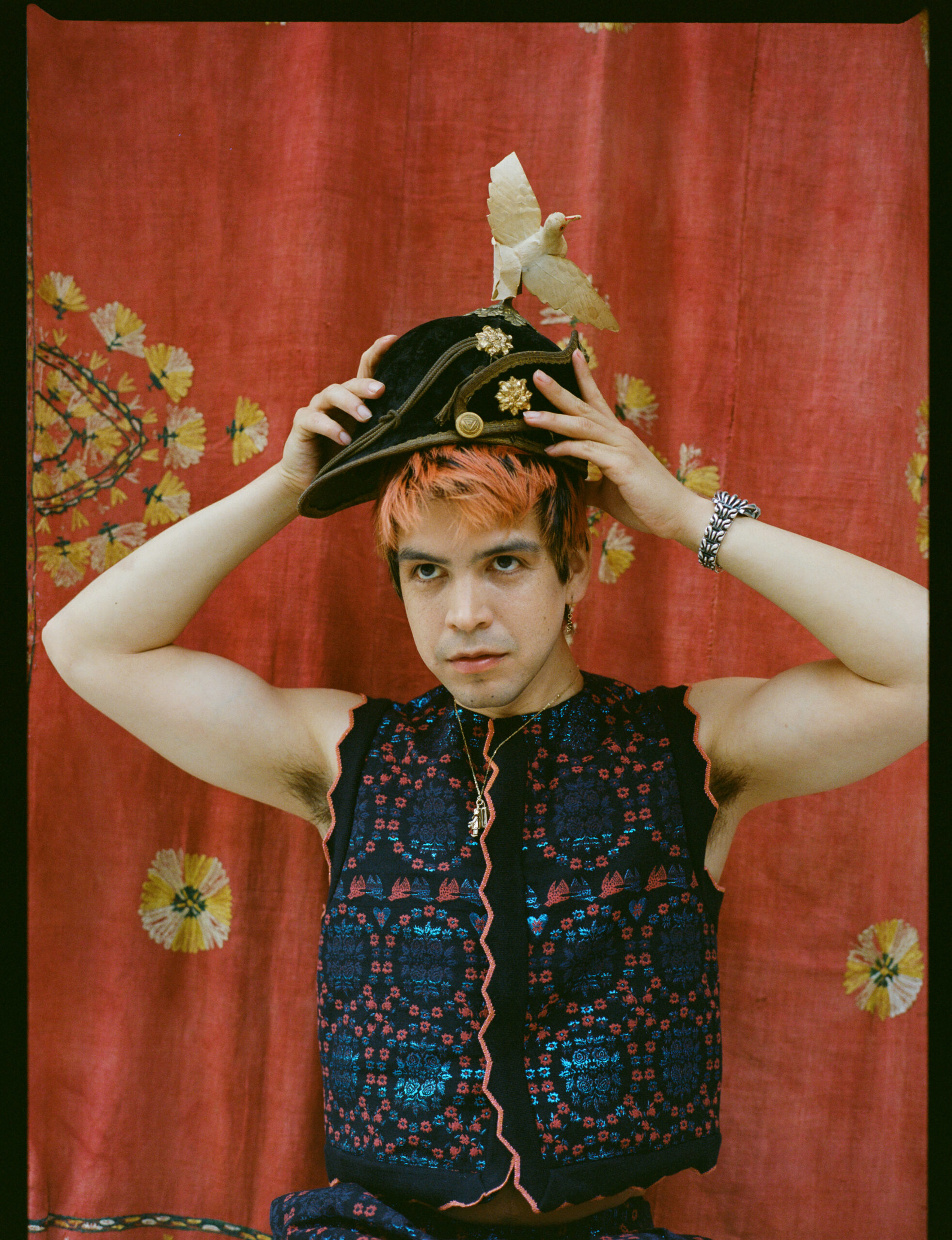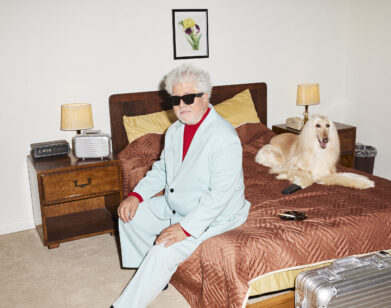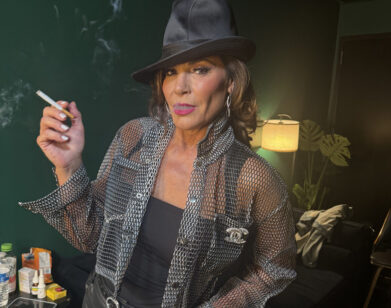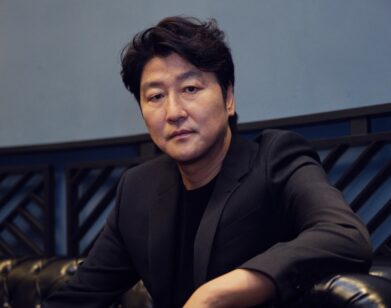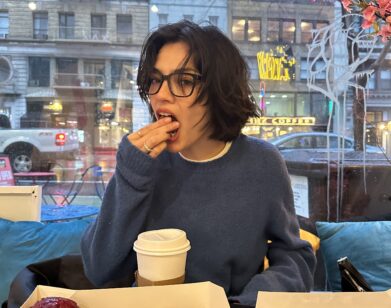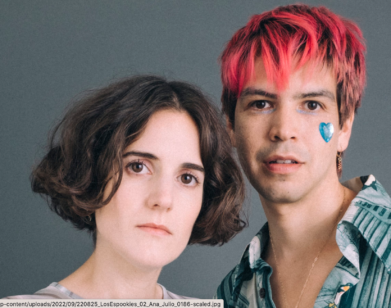DIRECTOR
“Fuck That Hairdresser”: Julio Torres, in Conversation with Alexa Demie
Julio Torres’ directorial debut, Problemista, is a love letter made by and for his friends, family, and all the main characters of New York City. The surrealist film, out today, demonstrates the comedian’s attunement to the inner lives of people (and inanimate objects), on display in his past work with Saturday Night Live and the hit Spanish-language comedy Los Espookys. In Problemista, Torres stars as an aspiring toy designer trying to outlast his soon-expiring Visa. His collaborators, Tilda Swinton, Isabella Rossellini, and Greta Lee, embody the kinds of characters you might encounter on through the streets of New York: the fresh implant who’s just bought a peacoat, the artist rocking a hair color that could only have been an accident, or yourself, caught in a frenzy, with your iPhone flashlight unintentionally activated. Ahead of the film’s release, Torres called up Euphoria star Alexa Demie to chat about collecting seashells and Barbies as a kid, fine-tuning his comedy in the shower, and collaborating with his mother, an architect who designed sets for the film. —LILY KWAK
———
ALEXA DEMIE: Hola!
JULIO TORRES: Hola. I love your thing.
DEMIE: How are you feeling?
TORRES: I don’t know, I’m starting press for this whole thing,
DEMIE: Do you like press usually or—
TORRES: No.
DEMIE: I’m with you, babes. Well, you’re going to like this one.
TORRES: I know.
DEMIE: I wrote all of these questions down out of sheer curiosity. How long was the film living inside of you before it started to actualize?
TORRES: Well, the movie is semi-autobiographical, so I was just living through the things that are depicted in the movie and around six years ago, I started to think, “Maybe there’s something here.” I started to write the characters and get the voice of Elizabeth, Tilda [Swinton]’s character, just having fun with that way of speaking and that fast-paced, aggressive thing that she does. It didn’t become a movie script until 2020.
DEMIE: What was the inspiration behind Tilda’s character, a fast-paced neurotic woman? Did you experience someone like that?
TORRES: A few.
DEMIE: A few. [Laughs] Okay.
TORRES: I was a really incompetent assistant to various people. If you had me as an assistant, something went wrong.
DEMIE: Something was off.
TORRES: Something went wrong and you didn’t have access to the batch of good assistants, so you ended up with me. [Laughs]
DEMIE: You don’t think they saw your innate creative ability and star power?
TORRES: I don’t think so. There was this woman I worked for who was recommended by a friend of a friend of a friend. I walk into her apartment and she’s frazzled, and she hands me her phone with a broken screen like, “Can you take care of this?” And then she hands me her credit card. Mind you, she’s never met me and she’s already given me her phone and her credit card. Then she’s like, “I also need a washer and a dryer.”
DEMIE: Any specifics? Like Whirlpool?
TORRES: No specifics. I don’t know anything about a washer or dryers, so I’m like, “What kind?” And she’s like, “I don’t know, whatever people in New York get,” because she was from L.A.
DEMIE: New York people do get different washers and dryers.
TORRES: [Laughs] Yeah. I was shocked. I feel like I seem trustworthy, which is what got me a lot of jobs, and I have a personality that puts people at ease.
DEMIE: I can attest to that. You put me at ease.
TORRES: I’ve been described as a scented candle.
DEMIE: That’s nice. So you had many women that inspired Tilda’s character.
TORRES: And men.
DEMIE: Men and women. How similar was your personal experience to the experience of your character? Because your character carries a lot of anxiety and doubt around the visa. How much anxiety did you feel in your personal life around that, and in those moments, what was your guiding light?
TORRES: I’m very, very close to the character, who I don’t even think of as a character. I think it’s more of a performance of a side of me. I’ve always been a pretty anxious person, which is the irony behind being called serene or a scented candle, but I was also so excited to take on a challenge. There was a high of being able to solve a very difficult problem. Those moments in my life were frustrating, but I remember one time thinking, “This is awful, and I love it.”
DEMIE: Where did that quality come from? Not everyone is excited to take on that kind of challenge.
TORRES: I think I was so protected as a kid that I wanted to prove myself. I felt like a little hero in my own story, and the excitement of wandering around New York, taking on different jobs, meeting people, and solving this big puzzle was really exciting. A lot of the time I was just overwhelmed, but I did get more out of it than a piece of paper, a visa. And my circumstances were so different. I mean, every immigration story is different.
DEMIE: Of course.
TORRES: But no one else relied on me. I don’t have kids. I was doing it for me, and I didn’t have to. I could have gone back to El Salvador and taught English or worked at a call center. That was available to me, which is not the case for most people. That made it feel like this journey was not just circumstance. It was chosen.
DEMIE: Your heart chose it.
TORRES: Yeah.
DEMIE: What was your first dream as a kid?
TORRES: I enjoyed everything that involves storytelling, but I always thought it was going to be something visual. A designer or an architect or something like that.
DEMIE: Is that what you went to school for?
TORRES: My grades were horrible. My ambitions were big and my GPA was low. The New School admitted me, but they didn’t give me enough scholarship money and I couldn’t take loans, because I didn’t have credit and neither did my parents. So I went to two years of advertising school in El Salvador, because it felt close enough to being a storyteller.
DEMIE: Yeah.
TORRES: I really didn’t like it, but I met some really cool friends there. I worked in advertising for a little bit, and then I reapplied to The New School, now having good grades from this advertising school, and they gave me a 90% scholarship or something crazy, which I don’t think they do anymore with international students. I just got an English degree because I truly hadn’t done my research at all. I wanted my major to be screenwriting and they were like, “We don’t have that. Why would you think we have that?”
DEMIE: English is the closest thing. Your mom is an architect and a designer. What part did she have in your movie? She designed the castle?
TORRES: Yes, she designed the little castle or treehouse in the movie. Previously, she and my sister designed the set for my HBO special that came out a few years ago.
DEMIE: Did you give her a lot of creative freedom?
TORRES: I think so. I see creating as sort of a love language, and trusting creativity as an expression of affection, so I’ve always seen her as a collaborator rather than my mom. It’s one of the things that I didn’t realize that I was going to love so much about what I do. I love working with people that I really trust and allowing them to do their own thing. The biggest compliment I can get is when someone says, “In your project I get to do all the things that I never get to do elsewhere.” That’s truly music to my ears.
DEMIE: That brings me to the artwork in the beginning of the film. Surrealism plays a big part in your storytelling. A friend of yours painted that, right?
TORRES: Yeah, his name’s Justin Liam O’Brien. We commissioned the painting after the movie was done, so he saw the movie and created this painting and we used it for the credits. Meeting with Catherine George, the wardrobe designer, and Tilda, we were looking at a lot of surrealism, a lot of Leonora Carrington.
DEMIE: Love her. Do you know Remedios Varo?
TORRES: Yeah, love her too. None of these things are calculated. The number of times that someone shows me another surrealist painting with a woman that looks like Tilda holding an egg is crazy.
DEMIE: There’s always an egg. Why do you think there was always an egg in their paintings?
TORRES: For me, it’s what RZA’s character [Bobby] says, that it’s about possibilities. It’s the excitement of something that hasn’t happened yet.
DEMIE: Hasn’t hatched. When you’re writing the script, are you visually seeing the world at the same time as you’re writing, or is that a different process for you?
TORRES: I have always seen what I’m writing. With this movie, I kept feeling the rhythm of New York, which inspired that sort of rhythmic way I was moving about the city. I kept seeing staircases and escalators and elevators and hallways. That was really what got me excited about directing it.
DEMIE: Because you weren’t going to direct it initially. I guess that’s another question I have, because this is something I think about a lot. How did you hold those two roles at the same time? Acting and directing it?
TORRES: No, when I was writing it, I was just writing it. I didn’t know that I was going to direct it and didn’t even know for sure that I wanted to be in it. After considering other directors, it just felt more exciting to do it myself. And Tilda was so excited about that, and it really made sense. As for how I did both at the same time, honestly, it felt easier.
DEMIE: You also mentioned that you didn’t think of him as a character. You were being this part of you that existed when you were dealing with that.
TORRES: You know what else really helped, is how comfortable my clothes were.
DEMIE: Yeah, I wasn’t expecting that look from you.
TORRES: It’s a little bit of me when I was fresh here, and it’s also a lot of my dad, actually. The fit of the pants, the sneaker.
DEMIE: That’s not something you were thinking about.
TORRES: It’s not, but it’s just how my love for him came out in this performance.
DEMIE: How do you deal with what you see in your head versus what actually gets made?
TORRES: Directing is collaborative. It’s not like painting where you’re just doing it by yourself. A lot of it is relying on people to fill in your blanks. Like Tilda’s big spiky dress that she wears, that is not how I saw it. But when sketches of it were presented, it made complete sense. Same with the hair.
DEMIE: What’s with the hair?
TORRES: When I was writing it, I was thinking short and white.
DEMIE: Did she want more color in her hair? A brighter red?
TORRES: We started talking about her character and I think I was like, “I’m seeing red,” and she said, “Maybe henna.” We were so into showing that shade of red that you see all the time, but never in movies. That shade of red that you end up getting by accident.
DEMIE: Yes.
TORRES: I loved that her hair looked like her haircut was fighting her hair texture. Like she was told that it was not going to look like in the magazine, and she got it anyway.
DEMIE: [Laughs]
TORRES: We were playing around. We were like, “She has to be adjusting her bangs constantly. She has to be thinking, ‘Fuck that hairdresser.’”
DEMIE: Yeah, when you have a fucked up cut, you’re always fidgeting. That’s funny. How much of the visual aspect did Tilda bring? How much of it was a collaboration?
TORRES: It was a really, really fun collaboration. There was the hair and the costume, but also the props, because I was like, “She needs to be holding a crumpled water bottle.”
DEMIE: The phone with the flashlight on.
TORRES: And a charger. She always has to look like she was in the middle of something she forgot and now she’s doing something else.
DEMIE: Asking the waiter to charge her phone. I’ve been at dinner with people that have asked that. I wouldn’t dare.
TORRES: Or you preface it with, “I know this is weird. I’m so sorry. Is there any chance?”
DEMIE: [Laughs] Objects and toys always find their way into your work.
TORRES: They do.
DEMIE: When did that start? What was the first object to steal your heart?
TORRES: I was a very, very toy-heavy child, partly because I was not a social kid at all. I had a collection of seashells, I had a rock collection.
DEMIE: They were your first characters, I’m assuming?
TORRES: Yeah. I loved Barbies. I loved anything that allowed me to feel like I was creating a story. My dad always had art books and monographs.
DEMIE: Do you feel your parents have influenced you as an artist?
TORRES: Totally, because they were always very smart, free thinking people. I remember the first time that we saw art with a naked person in school and kids lost it. They were giggling and I was just like—
DEMIE: That’s normal. I’ve seen that.
TORRES: So normal. It’s hanging on my walls.
DEMIE: It’s a beautiful way to grow up. Did you always know you had a great comedic sense? Did people around you say that?
TORRES: No. I felt it in late high school. I actually distinctly remember being in the shower and thinking, “Wait, I think I’m funny.”
DEMIE: What was it?
TORRES: By the time that I reached the end of my schooling I was more talkative. I stopped caring. I realized I had nothing to lose by not having friends, because I hadn’t so far and I was fine.
DEMIE: Then you start expressing and attract the friends that you wanted anyway.
TORRES: Yeah.
DEMIE: And to have your first film cast be so incredibly special and talented, not everyone gets that.
TORRES: Yes. Most of the people on screen are my friends. For a lot of them, this is their debut. It’s so cute that I used to think I was incapable of making friends and now I’m surrounded by them. It’s been such a joy to be like, “No, I don’t need to see auditions for this part because I know my friends can do this.”
DEMIE: That’s the dream, to just work with your friends.
TORRES: When I hear of huge projects that have various rounds of chemistry reads, I can’t imagine something less organic than putting two people in a room surrounded by executives and seeing if they can potentially be friends.
DEMIE: It’s so fucking nerve-wracking.
TORRES: You’re so good at this, by the way.
DEMIE: Oh, really?
TORRES: Yeah. Did you ever want to be a journalist?
DEMIE: I used to put on my grandma’s suits in the mirror and pretend I was a newscaster, but no. I’m just curious.
TORRES: You are curious. Have you seen To Die For with Nicole Kidman? Yeah.
DEMIE: Have I seen it? I recited it. Oh my god. But I want to ask, do you feel that there’s an overall theme or message within all of your work?
TORRES: There are definitely themes that keep coming up. The theme of an individual versus bureaucracy or system keeps coming up, and how we feel so alienated and othered by it. I also, like you, have a general curiosity in trying to understand where people come from emotionally. That’s something I really strived for in the movie. Even if the actor has no lines, I wanted them to feel like they are all the protagonists of their own story.
DEMIE: It shows. I don’t know if this is your friend, but the guy that moves in and takes your room—
TORRES: Yes.
DEMIE: He’s so real. When he’s coming in with the cup, I was like, “That is so fucking real.” The tension. You can tell that you do love each and every one of your characters.
TORRES: Because that’s also very New York. You know what I mean? It’s like you have this weird interaction at the bank or wherever and—
DEMIE: Yeah.
TORRES: I was also talking about his costuming like, “He just moved to New York. He needs a peacoat.”
DEMIE: Because when you go to New York, you get a trench or a peacoat. You’re like, “That’s New York.”
TORRES: You’re like, “I’m so New York.” And he needs an American Apparel V-neck. That’s the kind of guy that he is.
DEMIE: He was a standout for me. What’s a movie that you watched over and over again as a kid?
TORRES: Brave Little Toaster.
DEMIE: Aww.
TORRES: Specifically, the scene where the cars were singing about how they were going to get smooshed in the junkyard, and it was really sad. They were singing about the lives that they used to have, then they got compacted. I was like, “Again.”
DEMIE: We’ll leave it at that. I’m excited to see everything that is coming. I have personally seen Problemista twice.
TORRES: Oh my god. I’m coming to L.A., so let’s hang out.
DEMIE: Yes, let’s hang out.
*This interview was edited and condensed.

